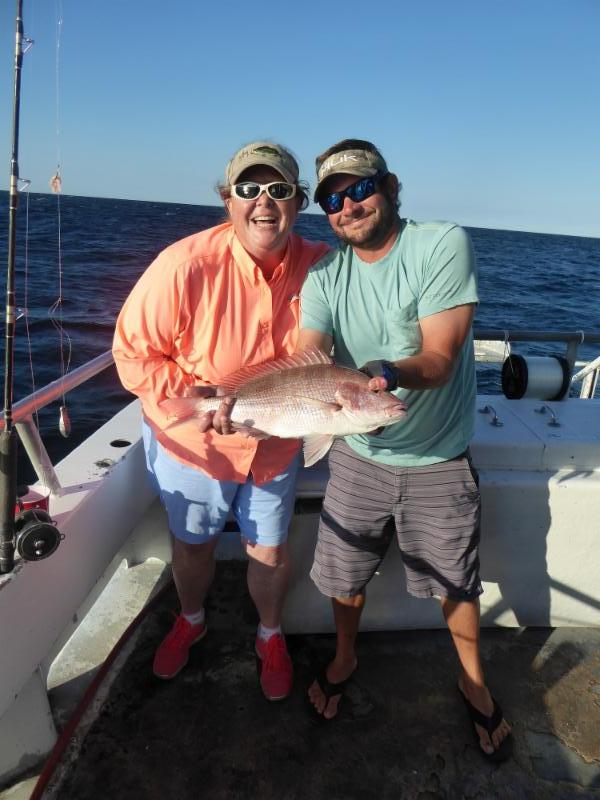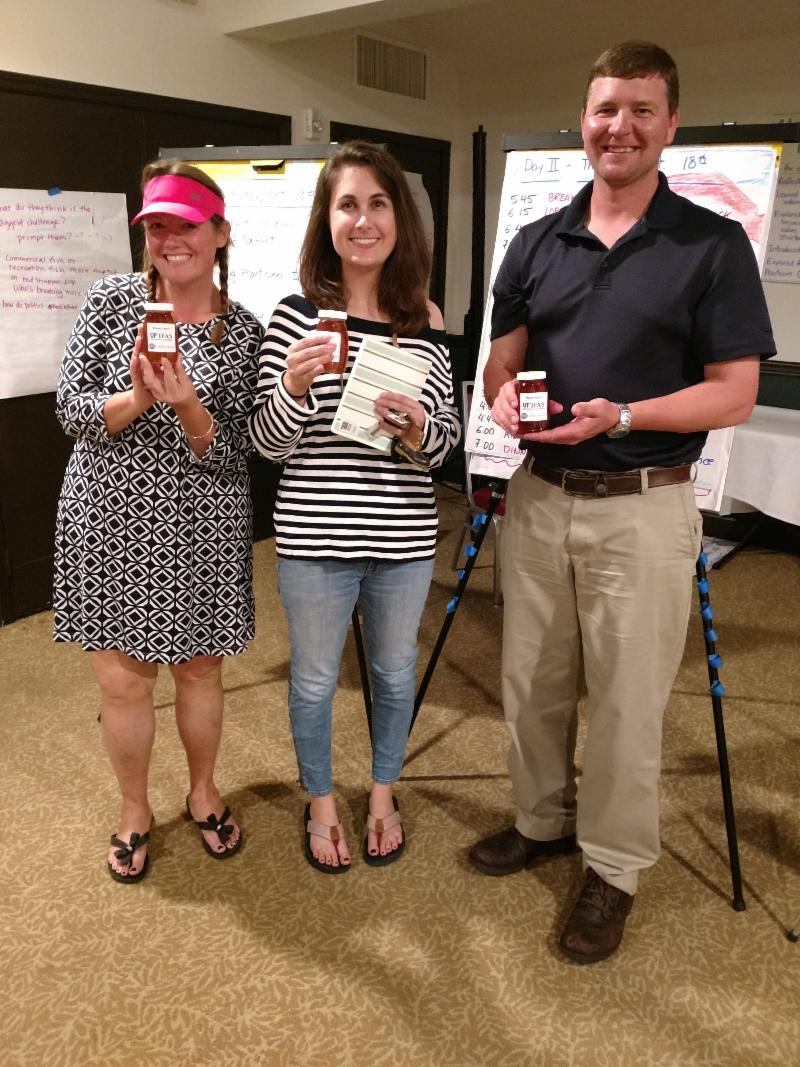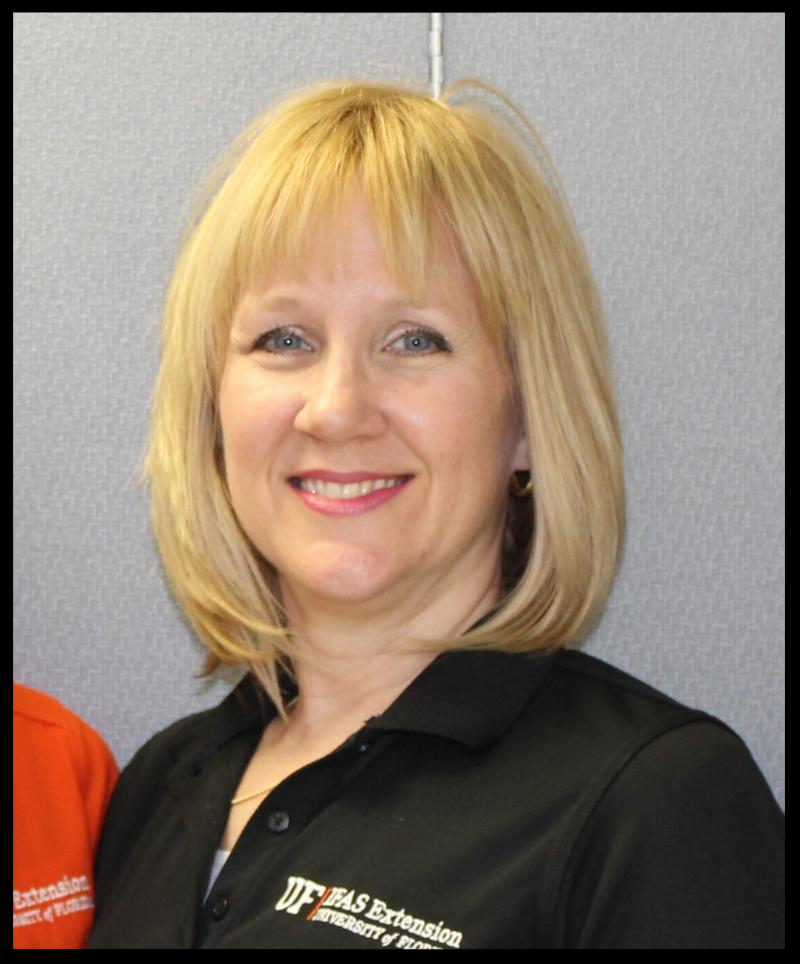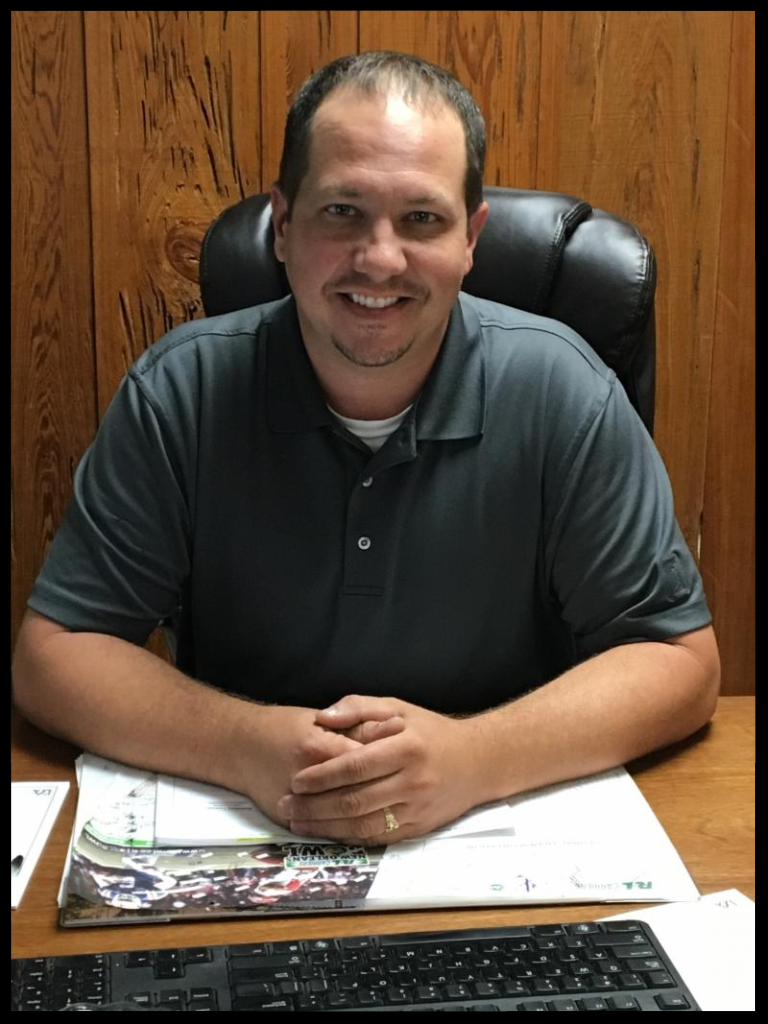|
|
|
|
 |
|
Class XVIII Fellows on an offshore charter fishing trip with American Spirit, Destin, FL, October 18, 2018.
|
|
|
|
Director's Corner
Thank you Jessica
After four years, Jessica Ireland is stepping down as Coordinator of the NRLI program. She has been named the new Coordinator for Florida Project Learning Tree (PLT),
an award-winning environmental education program at the University of Florida (
https://www.morningagclips.com/leading-the-florida-project-learning-tree/
). We at NRLI are proud of and excited for her as she takes the reins of PLT and know that she will, in the words of
SFRC Director Red Baker, "...knock it out of the park."
It is hard to exaggerate the impact Jessica has had on the NRLI program during her tenure as Coordinator and the list of her contributions is far too long for a short column like this. At the most visible level are things like this Newsletter (her initiative) and her gift for teaching. What most recognize and experience but don't really see, is her truly remarkable ability to, well, coordinate. Cambridge and Google dictionaries define a Coordinator as s
omeone whose job is to "make different groups work together in an organized way to achieve something" and "
organize events or activities and negotiate with others in order to ensure they work together effectively". That has been Jessica Ireland. From the moment she joined the project team, Jessica looked around and began organizing and coordinating: re-doing our web-page, establishing recruiting protocols and communicating, communicating, communicating, effectively, with everyone, all the time. She paid laser-focused attention to small details like locally grown, flowers at graduation and catering by local small businesses. She dove into big details like complex stakeholder panels, engaging and exciting field trips and program marketing. Contact NRLI and you got a response within 24 hours if not immediately. NRLI is a very, very complex program - hundreds of moving parts. As program Director, I knew that budgets were monitored, dietary restrictions noted, issues researched, and everything well-documented and organized. Always. Beyond coordinating, Jessica brought an understanding of natural resource issues and of curriculum design to NRLI. It made us a better program. We will miss having Jessica here at NRLI, a lot, but she leaves knowing that the program would not be where it is today without her effort and vision. And we know it too. Good luck Jessica, stay in touch and thank you for everything you have done.
~Jon Dain
|
|
|
|
|
|
|
Session 3
Fisheries Management: Red Snapper
NRLI Class XVIII met in Destin October 17-19 for session 3, focused on the red snapper fishery.
Ed Camp, Assistant Professor, Fisheries and Aquaculture Governance, Fisheries and Aquatic Sciences, University of Florida (NRLI alumnus, Class XVII) provided an overview of the regulatory structure of the red snapper fishery, as well as the complex history of management, diverse and competing stakeholder interests, and changing regulations
Fellows went on an offshore fishing trip with American Spirit. Although the red snapper season was closed, Fellows caught many species, including amberjack, vermillion snapper, and red snapper (catch and release). The tour was followed by lunch where the Fellows got to dine on their fresh caught fish and then an afternoon discussion with a panel of local stakeholders, each representing a specific perspective on the red snapper fishery. Stakeholders who joined the group were:
- Kristin Foss,Biological Scientist IV, Division of Marine Fisheries Management, Florida Fish and Wildlife Conservation Commission
- Doug Gregory, Former Executive Director, Gulf of Mexico Fishery Management Council
- Matt Wegener, Recreational Fisherman, Biological Scientist III, Florida Fish and Wildlife Conservation Commission
The Project Team would like to extend a huge thanks to NRLI alumni Erika Zambello, Matthew Wegener, Ed Camp, and Angela Collins for their help planning and organizing the session.
At session 3, the curriculum focus was roots of conflict and approaches for gathering information. Fellows explored additional roots of conflict beyond competing interests (values, relationships, structural issues, and data); learned approaches for gathering information; were introduced to the situation assessment matrix; reflected on perceptions and bias; and heard from alumni about their practicum experience.
|
Each month, we ask a pair of Fellows to review the session in their own words. This article describes reflections from the point of view of Fellow Stacey Simmons
|
Fellows' Article
 D
riving west on Interstate-10 last week was a supernatural experience. Faint glimpses of cotton fields and empty pastures peaked through the tangled mess of downed trees along Interstate 10. I was on my way to Destin, Florida for NRLI Session 3. It was one week after Hurricane Michael swept through the beautiful panhandle of Florida. The drive in was humbling. If you have lived in Florida for some time, you too have experienced the stress of pending storms and, worse, the aftermath of mother nature!
The session explored the Red Snapper, a species of popular fish. We learned Destin is the mecca for this species.The geography of this location lends it to be the Red Snapper capital of North America. Yes, the Red Snapper can be caught along the Gulf of Mexico from Texas to Florida, but Destin is the hot spot, so we were told. The second day of the session, most of the group ventured out on the American Spirit for a half day of fishing--well catching was more like it! Red Snapper was not in season, so many were released back into the water. We did have great success with catching other species. The group's collective catch was taken to a local restaurant that prepared our feast. Platters of fish prepared different ways provided more fish than could be consumed in one sitting. I ranked this as one of the best meals of all times!
We did take a brief break during session to visit with several past Alumni. They shared their class experiences and highlights of their practicums. It was useful and comforting to know not to stress about the actual practicum. I felt more relaxed and confident in my choice of subject matter. After enjoying comradery and the most amazing views of the water, we returned to class for a round table discussion on what makes a great practicum.
I highly recommend that you plan a vacation to explore this amazing Florida destination. I cannot wait to return to Destin with my family to enjoy another awesome day on the water. As you know, NRLI is packed full of action so a beach day will have to be included, as will a trip to the local aquarium.
|
|
Alumni Roundtable
 On Saturday evening, three alumni joined the group for the Alumni Roundtable during which they shared experiences related to the NRLI practicum.
Class XIII -- Holly Edmond, Environmental Manager, Office of Agricultural Water Policy, Florida Department of Agriculture and Consumer Services.
Class XVI -- Erika Zambello,Communications and Marketing Coordinator, Choctawhatchee Basin Alliance and Matt Wegener, Fisheries Biologist, Florida Fish and Wildlife Conservation Commission- Fish and Wildlife Research Institute.
Outcomes of their practica included a communications product encouraging youth participation in state parks, a partnership network to bridge the gap between students and professionals, and a deepened understanding of producers' perceptions on best management action plans (BMAPs) in the Santa Fe river basin. Each used different methods for engaging stakeholders to gather information ranging from face-to-face interviews and farm visits, to teleconference calls, emails and group meetings. Matt and Erika mentioned the value of working with Fellows in their cohort, illustrating that this teamwork could happen in the planning and strategizing stages or during activity execution.
|
|
Spotlight on Class XVIII Fellows
 Ashley Pardee Ashley Pardee
Assistant
Wetland Preserve LLC
Ashley Pardee is a Florida native who grew up on the banks of the Saint Johns River in Jacksonville. She holds a bachelor's degree in anthropology from University of North Florida, is a Master Naturalist, and volunteers her time to the newly organized North Florida Prescribed Burn Association. Ashley also runs a small business in Jacksonville Beach, "The Wooden Canoe," and works on Wetland Preserve, her family tree farm in Palatka. She enjoys spending time with her five nieces, kayaking, and traveling with her husband, Buck, in her free time.
 Katherine Allen Katherine Allen
County Extension Director; Extension Agent IV-Family, Youth, & Community Sciences
UF/IFAS Extension
No! The word on Katherine Allen's shirt caused dissonance with her servant's heart. Her desire to help is why she has been with the University of Florida Extension service for over 23 years. Currently serving as the County Extension Director in Suwannee County, Katherine has worked in a variety of counties both large (Orange County-Orlando) to small (Suwannee County).
Extension has allowed her to be a lifelong learner, starting as the only Energy Extension Agent statewide working with restaurateurs; to teaching food safety; then providing energy and water conservation-focused continuing education for builders, building inspectors and architects; to recently implementing weight management research trials in rural communities. In addition to her responsibility for overseeing the Suwannee County operations, her role as a Family and Consumer Sciences Agent allows her to bring the research and education from the University of Florida so people can use it. "The diversity of the classes and workshops has allowed me to share my love of learning with others", Katherine explains. "Whether it is the excitement of a participant's first jar of homemade salsa they learned to can properly or the thank you note received after a participant attended an end of life seminar, I feel good knowing that I have been a part of making someone's life a little heathier, less expensive or have more value."
Since moving to Suwannee County, she has gotten more involved in community development. An opportunity to participate in the Kettering Foundation's issue gathering process and consequent exposure to the various issue guides has led to an interest in civil discourse and civic engagement. So, being one of the NRLI class 18 fellows was part of this new journey to refine and practice facilitation skills for people who are passionate about issues.
Katherine has a BAA degree in Interpersonal and Public Communications from Central Michigan University and a MA in Instructional Technology: Instructional Systems from University of Central Florida. She loves live performances whether it is theatre or music. Her own backyard has been transformed into one of her favorite places, but she is pulled by the allure of the waterfront.
 Jay Garcia Jay Garcia
Wildlife Biologist
Ocala National Forest, U.S. Forest Service
Jay is a Wildlife Biologist with the US Forest Service at the Ocala National Forest. He focuses (naturally) on management of the Florida Scrub-Jay and other animal and plant species endemic to the Florida scrub. Jay recently participated in the drafting and passage of a Forest Plan Amendment that designated over 50,000 acres of scrub habitat for early successional management for Scrub-Jays and other scrub species. He is a member of the Florida Scrub-Jay Recovery Team and is the lead on projects involving federally listed plant species on the Forest.
Jay earned a Bachelor's Degree in Wildlife Ecology and Conservation from the University of Florida and a Master of Science in Forest Resources from Clemson University, where he studied the nesting ecology of the Painted Bunting. He lives in Howey-in-the-Hills, Florida with his wife Moira and their dog Finn. They like to travel, cook, garden, and hike together.
 Chad Roberts Chad Roberts
Director of Marketing
Florida Farm Bureau Federation
Chad Roberts is the Director of the Florida Farm Bureau Marketing Division which is also known as the Florida Agricultural Marketing Association (FAMA). FAMA markets and distributes Farm Bureau Member-produced products throughout the country through various programs such as Fundraising, Gift Fruit, Reciprocal (Buyer's Club) and other state Farm Bureau Sales. To learn more about what goes on at FAMA visit our website at
www.fwffb.com.
Chad currently resides in Eustis, FL which is in close proximity to Leesburg where the FAMA office is located. He has a B.S. in Food and Resource Economics from the University of Florida. He has been married to his wife Crystal for 6 years and they have three boys; Cooper (4.5 years), Colby (3 years) and Cayden (5 months). Chad enjoys deer hunting on his leased land in Alabama in the cooler months and fishing the coasts of Florida the rest of the year.
|
Class XVIII Fellows
Katherine Allen,
County Extension Director; Extension Agent IV-Family, Youth, and Community Sciences, UF/IFAS Extension
Ethan Basore,
Harvest Operations, TKM Bengard Farms LLC
Vanessa Bessey,
Environmental Administrator, Florida Department of Agriculture and Consumer Services, Office of Agricultural Water Policy
Rena Borkhataria,
Research Assistant Professor, Wildlife Ecology & Conservation, Everglades Research and Education Center, University of Florida/IFAS
Hannah Brown,
Communications Manager, PhD Student, School of Natural Resources and Environment, University of Florida
Amy Copeland, South Region Land Manager
, St. Johns River Water Management District
Yesenia Escribano,
Environmental Consultant, Florida Department of Agriculture and Consumer Services, Office of Agricultural Water Policy
Cyndi Fernandez,
Assistant Director, Conservation Florida
Ashleigh Fountain,
Biologist-Planning Technical Lead, Coastal Navigation Section, U.S. Army Corps of Engineers, Jacksonville District
Jay Garcia,
Wildlife Biologist, U.S. Forest Service
Derrell Jones,
Captain, Florida Fish and Wildlife Conservation Commission
Catherine Kennedy,
Senior Wildlife Assistance Biologist, Florida Fish and Wildlife Conservation Commission
William McKinstry,
Land Management Program Manager, Suwannee River Water Management District
Benjamin Melnick,
Deputy Director, Division of Water Resource Management, Florida Department of Environmental Protection
Lourdes Mena,
Fish and Wildlife Biologist, U.S. Fish and Wildlife Service
Ashley Pardee, Assistant, Wetland Preserve LLC
Chad Roberts,
Director of Marketing, Florida Farm Bureau Federation
Brian Scheick,
Assistant Research Scientist, Florida Fish and Wildlife Conservation Commission
Karen Schlatter,
Associate Director, Colorado River Delta Program, Sonoran Institute
Wesley Seitz,
Public Hunting Areas Biologist, Florida Fish and Wildlife Conservation Commission
Stacey Simmons,
Environmental Specialist III, Florida Department of Agriculture and Consumer Services, Office of Agricultural Water Policy
Jessica Sutt,
Wildlife Refuge Specialist, Southwest Florida Gulf Coast Refuge Complex, U.S. Fish and Wildlife Service
Lily Swanbrow Becker, Climate
Adaptation Coordinator, Florida Fish and Wildlife Conservation Commission
Erica Waller, Environmental Educator
Class XVIII Schedule
| Dates |
Topic |
Location |
| August 22-24, 2018 |
Coastal Erosion & Community Resilience |
Cedar Key |
| September 26-28, 2018 |
Endangered Species: The Future of the Florida Panther |
Immokalee |
| October 17-19, 2018 |
Fisheries Management: Red Snapper |
Destin |
| November 14-16, 2018 |
Sea Level Rise: Threats to & Solutions for Urban Areas |
Miami |
| January 23-25, 2019 |
Changing Dynamics in Agriculture & Rural Communities |
Clewiston |
| February 20-22, 2019 |
Water Quality: Springs & Agriculture |
Dowling Park |
| March 20-22, 2019 |
Wildlife Corridors |
Keystone Heights |
|
April 10-12, 2019
|
Graduation & Practicum Presentations |
Gainesville |
|
|
|
|